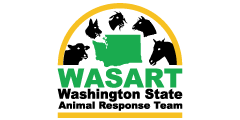Acknowledgement of Sufficient Knowledge of Blood Born Pathogens
The Washington Administration Code (WAC) 118-04-120 requires knowledge of Blood Borne Pathogens as outlined below. You can meet this requirement by reading and signing this form online (below). Otherwise, you must take a class covering the material and provide proof of that class to credentials@wasart.org.
What is a Blood Borne Pathogen: microorganisms that are carried in blood that can cause diseases in humans
Common Blood Borne Pathogen diseases: malaria; syphilis; Hepatitis B and C, Human Immunodeficiency Virus (HIV)
Potentially Infectious Bodily Fluids: skin tissue, cell cultures; blood; saliva; vomit; urine; semen or vaginal secretions; any other bodily fluid
Transmission Potential: contact with another person’s blood or bodily fluid that may contain blood; mucous membranes = eyes, mouth, nose; open cuts or skin abrasions; contaminated sharps/needles
Universal Precautions: use of proper Personal Protection Equipment (PPE); treat all blood and bodily fluids as if contaminated; proper cleanup and decontamination; disposal of all contaminated material in the proper manner
Personal Protective Equipment: items used to protect a person from exposure; latex or Nitrile gloves, safety glasses/goggles, face mask, face shield, CPR mouth barriers, apron, gown, coverall, respirators
Hand Washing: wash hands immediately after removing PPE; use a detergent or soap; a hand sanitizer can also be used, but wash with soap and water as soon as possible
I have read and understood the above information on Blood Borne Pathogens. I understand I will need to meet this requirement again in twoyears.
Sign here: signature form.
